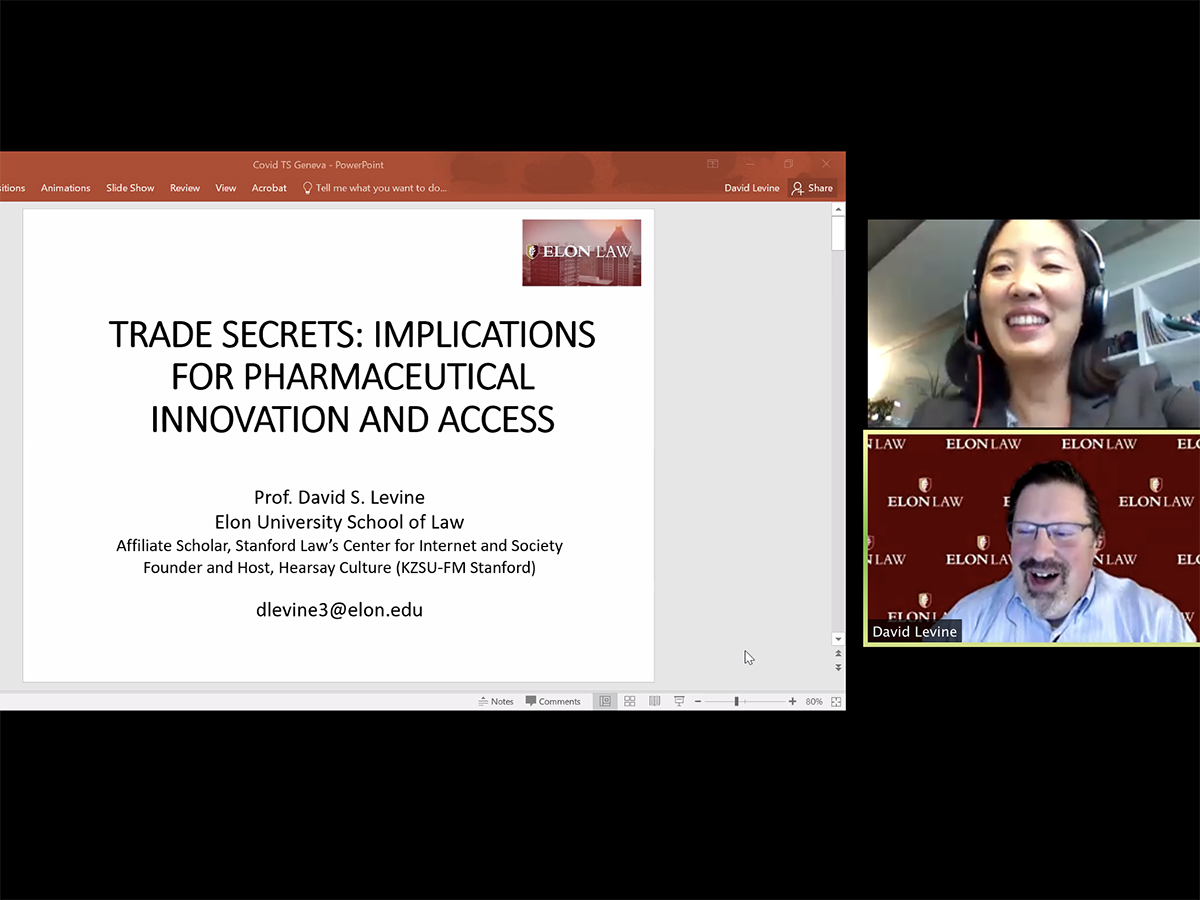Professor David S. Levine outlined the ways in which legal scholars and medical practitioners must better understand how intellectual property laws can help - or hinder - the pursuit of therapeutics and vaccines.
An Elon Law professor addressed a global audience of scholars, practitioners and advocates in September with a webinar presentation on the way trade secrecy laws might influence whether pharmaceutical companies choose to share information related to the development of a COVID-19 vaccine.
Professor David S. Levine’s talk, “Trade Secrets: Implications for Pharmaceutical Innovation and Access”, was part of a series led by the Knowledge Network for Innovation and Access to Medicines, a project of the Global Health Centre at the Geneva Institute.
“It is essential that experts and civil society groups understand the centrality of trade secrecy to developing affordable and effective vaccines, treatments, and diagnostics, that are available to all,” Levine said about his webinar on September 24, 2020. “Trade secrecy remains significantly misunderstood, so I was delighted to accept the Geneva Institute’s invitation, especially given its leadership on addressing global health crises like the COVID-19 pandemic.
“In fact, not only do we need to address information access and sharing challenges for this pandemic, but as we are likely to face additional pandemics, I’d hope that we can learn from our errors since January so that we are better prepared next time.”

In his webinar, Levine described trade secrecy as the least researched area of intellectual property law, which also includes patents, copyrights, and trademarks. The latter three areas focus on ideas, works of authorship, and brand names or logos. Trade secrets, Levine said, covers all information, and creates rights in information that derives its value from being not generally known.
COVID-19 highlights the relevance of understanding how trade secrets are governed, Levine said, and it prompts conversation on the “appropriate balance between access to information and secrecy.” As companies work to produce therapeutics for controlling a global pandemic, the need to understand the impact of trade secrecy law is paramount.
For example: A pharmaceutical company pursuing a COVID-19 vaccine might consider manufacturing processes and methods, formulas, cell lines, genomic information, sales projections – even what “doesn’t” work – information covered by trade secrecy. If shared within the pharmaceutical industry, use of this information now could expedite the creation of affordable treatments and vaccines for the entire world.
“Trade secrecy law exists to protect trade secret owners from misappropriation and it is very well received in the broad panoply of intellectual property rights,” Levine said. “The next pandemic, which inevitably will come, requires us to think very carefully right now about what we might do.”
Levine joined the Elon Law faculty in 2009 and has developed an international reputation for his legal research into the areas of lawmaking, trade secrecy, and the ways in which corporations and governments use the law to control access to intellectual property.
An affiliate scholar at the Center for Internet and Society at Stanford Law School, Levine also was a fellow at Princeton University’s Center for Information Technology Policy from 2014-2017. He is the founder and host of Stanford University’s KZSU-FM “Hearsay Culture,” an information policy, intellectual property law and technology talk show, and he co-authored the 2019 textbook “Information Law, Governance, and Cybersecurity.”
In recognition of his scholarly work, Levine was named the Jennings Professor and Emerging Scholar at Elon Law for 2017-2019. During October, Levine will be presenting and discussing his COVID-19 work in events hosted by the University of New Hampshire Franklin Pierce School of Law and the Third World Network.



